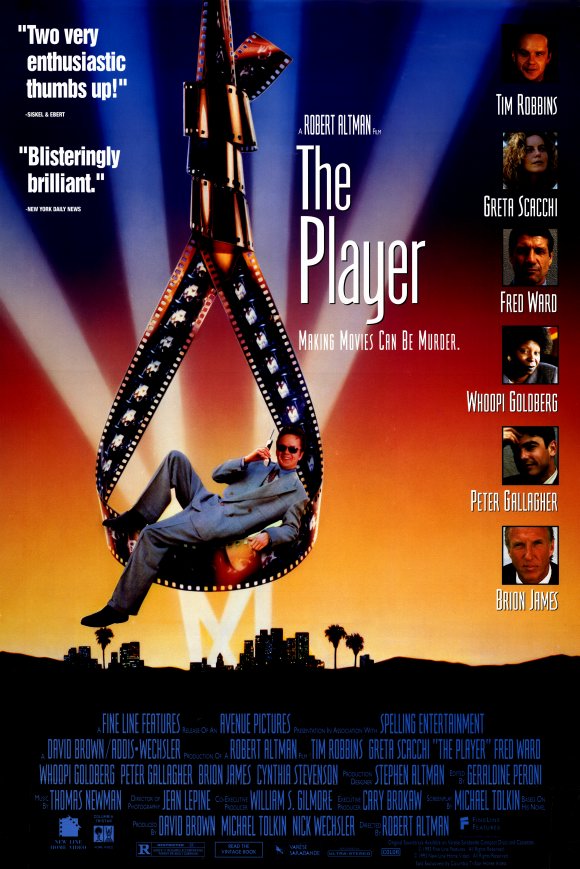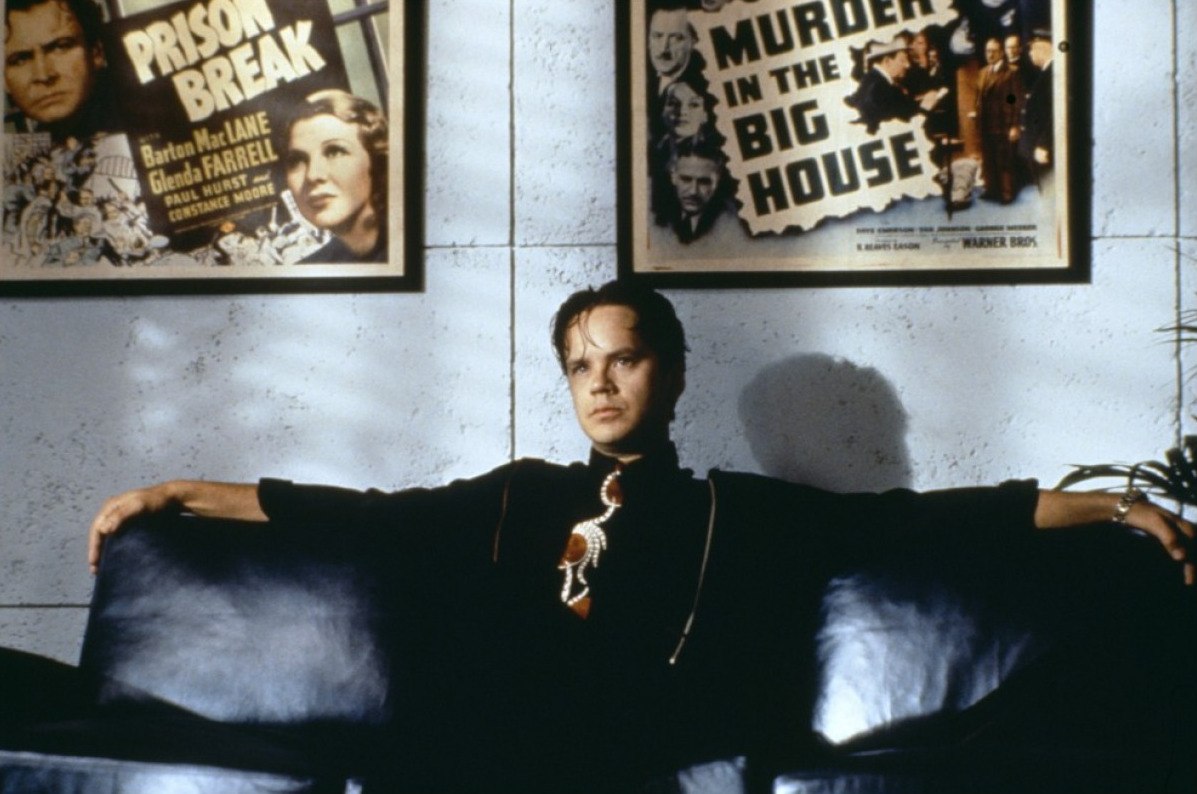← Back to Reviews
in
THE PLAYER
In my recent review of Rear Window, I mentioned that Hitchcock's direction was always the standout element of the film. After watching 1992's The Player, a Best Picture nominee that earned the director one of his five directing nominations, I think this was also true of the legendary Robert Altman, who takes a standard crime story and lays it on top of a slick Hollywood canvas rich with star power, multi-layered star power that you need a scorecard to keep track of.

Based on a novel by Michael Tolkin, this is the story of Griffin Mill (Tim Robbins),a movie studio executive whose primary job duty is listening to writers pitch ideas for movies and the fate of whether or not these pitches actually become movies often rests on Griffin's opinion alone. While juggling multiple pitches and his job being threatened by another executive named Larry Levy (Peter Gallagher), Griffin begins receiving threatening postcards from a writer whose pitch he rejected but, of course, Griffin has rejected so many ideas that he has no idea who is making the threats. Griffin does some discreet detective work and decides that the threats have to be coming from a writer named David Kahane (Vincent D'Onofrio) and decides to confront him. The confrontation goes terribly wrong resulting in David's death and the beginning of Griffin's battle for self-preservation, further complicated by Griffin's attraction to David's girlfriend (Greta Scacchi).

Tolkin was allowed to do his own screenplay adaptation, which I always feel is a plus, presenting a conventional crime story on a glittery Hollywood canvas that is hard to resist. But there are two elements that really make this story work. One is this central character of Griffin Mill, a constant enigma who we're really not sure if we are supposed to sympathize with or not, because if you watch him in the pitch meetings or dealing with David or anybody else in the movie for that matter, this is guy is kind of a dick and it's kind of hard to feel sorry for him when he gets himself in trouble. This lack of sympathy is further documented by the fact that Griffin is never completely honest with anyone about what happened with David Kahane. Usually, when a movie character has remorse about something, they want to confess to somebody but Griffin never really does. Ironically, he tries to confess to David's girlfriend but she doesn't want to hear it.

The other element that leaps off the screen is Altman's directorial eye and his multi-layered use of star power here, never used to this extent before. First we have the characters previously discussed, played by mostly A-list actors. Then we have the actors playing parts in the movies within the movies like Scott Glenn, Lily Tomlin, Julia Roberts, and Bruce Willis. Then we have the stars who appear as themselves as part of the Hollywood canvas, many Altman rep company members including Anjelica Huston, John Cusack, Burt Reynolds, Sally Kellerman, Jack Lemmon, Felicia Farr, Nick Nolte, Malcolm McDowell, Steve Allen, Harry Belafonte, Buck Henry, Cher, James Coburn, and Paul Dooley. I thought it such clever writing that Griffin's encounters with Reynolds and McDowell were extremely unpleasant and that neither star had a nice word to say about Griffin. There is a brilliant directorial moment where Griffin leaves Reynolds' table at a restaurant to join another table and the camera quietly floats between both tables so that Altman forces the viewer to listen to what is happening at both tables...classic Altman.

Tim Robbins offers a razor sharp performance as Mill, a performance on par with his work in The Shawshank Redemption. He gets solid support from Fred Ward as the movie studio security head, Cynthia Stevenson as his co-worker/girlfriend. Whoopi Goldberg as a police detective, and Sydney Pollack as a studio lawyer. Altman has employed first rate art direction/set direction...love all the studio offices decorated with classic movie posters, though I was a little disappointed when Griffin was told he had a phone call from Joe Gillis and he didn't know that Joe Gillis was William Holden's character in Sunset Boulevard, any real movie executive would know that name immediately, but it's a little thing in a movie that ruffles feathers, but works.
In my recent review of Rear Window, I mentioned that Hitchcock's direction was always the standout element of the film. After watching 1992's The Player, a Best Picture nominee that earned the director one of his five directing nominations, I think this was also true of the legendary Robert Altman, who takes a standard crime story and lays it on top of a slick Hollywood canvas rich with star power, multi-layered star power that you need a scorecard to keep track of.

Based on a novel by Michael Tolkin, this is the story of Griffin Mill (Tim Robbins),a movie studio executive whose primary job duty is listening to writers pitch ideas for movies and the fate of whether or not these pitches actually become movies often rests on Griffin's opinion alone. While juggling multiple pitches and his job being threatened by another executive named Larry Levy (Peter Gallagher), Griffin begins receiving threatening postcards from a writer whose pitch he rejected but, of course, Griffin has rejected so many ideas that he has no idea who is making the threats. Griffin does some discreet detective work and decides that the threats have to be coming from a writer named David Kahane (Vincent D'Onofrio) and decides to confront him. The confrontation goes terribly wrong resulting in David's death and the beginning of Griffin's battle for self-preservation, further complicated by Griffin's attraction to David's girlfriend (Greta Scacchi).

Tolkin was allowed to do his own screenplay adaptation, which I always feel is a plus, presenting a conventional crime story on a glittery Hollywood canvas that is hard to resist. But there are two elements that really make this story work. One is this central character of Griffin Mill, a constant enigma who we're really not sure if we are supposed to sympathize with or not, because if you watch him in the pitch meetings or dealing with David or anybody else in the movie for that matter, this is guy is kind of a dick and it's kind of hard to feel sorry for him when he gets himself in trouble. This lack of sympathy is further documented by the fact that Griffin is never completely honest with anyone about what happened with David Kahane. Usually, when a movie character has remorse about something, they want to confess to somebody but Griffin never really does. Ironically, he tries to confess to David's girlfriend but she doesn't want to hear it.

The other element that leaps off the screen is Altman's directorial eye and his multi-layered use of star power here, never used to this extent before. First we have the characters previously discussed, played by mostly A-list actors. Then we have the actors playing parts in the movies within the movies like Scott Glenn, Lily Tomlin, Julia Roberts, and Bruce Willis. Then we have the stars who appear as themselves as part of the Hollywood canvas, many Altman rep company members including Anjelica Huston, John Cusack, Burt Reynolds, Sally Kellerman, Jack Lemmon, Felicia Farr, Nick Nolte, Malcolm McDowell, Steve Allen, Harry Belafonte, Buck Henry, Cher, James Coburn, and Paul Dooley. I thought it such clever writing that Griffin's encounters with Reynolds and McDowell were extremely unpleasant and that neither star had a nice word to say about Griffin. There is a brilliant directorial moment where Griffin leaves Reynolds' table at a restaurant to join another table and the camera quietly floats between both tables so that Altman forces the viewer to listen to what is happening at both tables...classic Altman.

Tim Robbins offers a razor sharp performance as Mill, a performance on par with his work in The Shawshank Redemption. He gets solid support from Fred Ward as the movie studio security head, Cynthia Stevenson as his co-worker/girlfriend. Whoopi Goldberg as a police detective, and Sydney Pollack as a studio lawyer. Altman has employed first rate art direction/set direction...love all the studio offices decorated with classic movie posters, though I was a little disappointed when Griffin was told he had a phone call from Joe Gillis and he didn't know that Joe Gillis was William Holden's character in Sunset Boulevard, any real movie executive would know that name immediately, but it's a little thing in a movie that ruffles feathers, but works.
